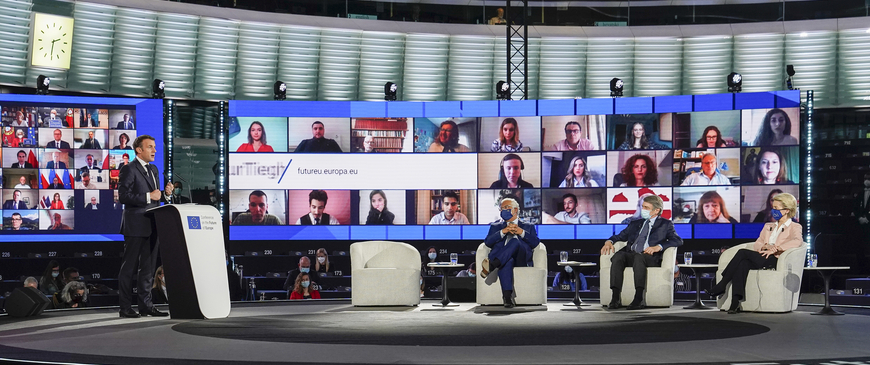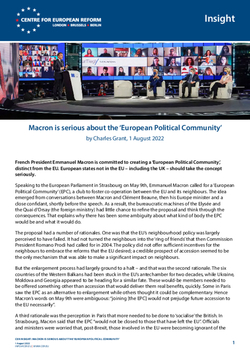
Macron is serious about the 'European Political Community'
French President Emmanuel Macron is committed to creating a ‘European Political Community’, distinct from the EU. European states not in the EU – including the UK – should take the concept seriously.
Speaking to the European Parliament in Strasbourg on May 9th, Emmanuel Macron called for a ‘European Political Community’ (EPC), a club to foster co-operation between the EU and its neighbours. The idea emerged from conversations between Macron and Clément Beaune, then his Europe minister and a close confidant, shortly before the speech. As a result, the bureaucratic machines of the Elysée and the Quai d’Orsay (the foreign ministry) had little chance to refine the proposal and think through the consequences. That explains why there has been some ambiguity about what kind of body the EPC would be and what it would do.
Emmanuel Macron called for a ‘European Political Community’ (EPC), a club to foster co-operation between the EU and its neighbours.
The proposal had a number of rationales. One was that the EU’s neighbourhood policy was largely perceived to have failed. It had not turned the neighbours into the ‘ring of friends’ that then Commission President Romano Prodi had called for in 2004. The policy did not offer sufficient incentives for the neighbours to embrace the reforms that the EU desired; a credible prospect of accession seemed to be the only mechanism that was able to make a significant impact on neighbours.
But the enlargement process had largely ground to a halt – and that was the second rationale. The six countries of the Western Balkans had been stuck in the EU’s antechamber for two decades, while Ukraine, Moldova and Georgia appeared to be heading for a similar fate. These would-be members needed to be offered something other than accession that would deliver them real benefits, quickly. Some in Paris saw the EPC as an alternative to enlargement while others thought it could be complementary. Hence Macron’s words on May 9th were ambiguous: “joining [the EPC] would not prejudge future accession to the EU necessarily”.
A third rationale was the perception in Paris that more needed to be done to ‘socialise’ the British. In Strasbourg, Macron said that the EPC “would not be closed to those that have left the EU”. Officials and ministers were worried that, post-Brexit, those involved in the EU were becoming ignorant of the British and how they thought, and vice versa. A few years ago, Macron had suggested the creation of a European Security Council that would include the UK, but the idea did not take off (neither Britain nor Germany nor the smaller EU countries were keen).
Macron also thinks that quite apart from the need for socialisation for the UK, Europe lacks a forum where all its governments can discuss common strategic challenges like how to handle Russia, improve energy security or tackle continent-wide migration challenges. That is a fourth rationale. One French official says that while evidently the EPC would not touch on collective defence, it could talk about the softer end of security such as cyber security and disinformation.
Turkey needs to belong to such a club too, according to some in Paris. Others are not sure whether Turkey’s current government is sufficiently committed to European values to warrant an invitation. One official suggests that if Turkey joined the EPC and could be given an improved customs union with the EU, it might then be happy to abandon its moribund accession talks. In a similar vein, another muses that if Hungary could be satisfied with taking part in the EPC it might volunteer to leave the EU. Yet another official suggests that if one day Russia was democratic, it could be invited to join.
Macron’s EPC echoes François Mitterrand’s proposal for a ‘European confederation’, launched in a speech on December 31st 1989. That idea did not get very far, because Mitterrand tried to include Russia, and because the scheme was clearly intended as an alternative to EU enlargement, both of which annoyed the Central Europeans. (Some also see parallels with the Union for the Mediterranean, a club launched by President Nicolas Sarkozy in 2008, which brought together the EU countries and those on the shores of the Mediterranean. It still exists but has not achieved a great deal.)
The initial reaction of many Central and East European countries (CEECs) to Macron’s May 9th speech was negative. Despite its ambiguity on the relationship between the EPC and enlargement, they were mistrustful of the French, partly because of Macron’s repeated efforts to negotiate with Vladimir Putin, and they assumed the scheme was all about preventing Ukraine from joining the EU.
The initial reaction of many Central and East European countries (CEECs) to Macron’s May 9th speech was negative.
In Paris, officials soon saw the problem and the French government was within days briefing that the EPC was in no way an alternative to enlargement. Macron was in any case on a journey towards accepting that Ukraine should receive candidate status – which the EU offered in June. Some French officials regret that Macron did not clarify on May 9th that the EPC was not intended to stop enlargement. The ambiguity had damaged the concept in several Baltic and East European capitals.
The French have subsequently gone into overdrive to bring round the member-states to support the idea, and Macron used the European Council dinner on June 23rd to persuade the doubters. The CEECs are still wary of the EPC but, given France’s support for Ukraine’s candidate status, are not going to block it. Italy was enthusiastic, before Mario Draghi’s government fell (Enrico Letta, leader of the centre-left Democratic Party, has put forward a similar scheme of his own). So does Charles Michel, the president of the European Council, who has himself proposed the creation of a ‘European Geopolitical Community’ that is very similar to Macron’s scheme.
Berlin has been unenthusiastic about the EPC, much to Paris’ annoyance. Initially Berlin was miffed not to have been briefed or consulted before the initiative was launched. Some in Berlin worried that new organisations and institutions cost money and that the Germans would be expected to foot the bill. Others still feared that an EU committed to an EPC would go slow on the accession process, with adverse consequences for the Western Balkans. But some influential German politicians such as Norbert Röttgen (a Christian Democrat) are supportive, and overall Germany will not block the EPC.
When I was in Paris a few weeks ago, there was no grand plan for the EPC. Different officials were pushing rival versions. One group wants to focus most on supporting the pre-accession countries, by giving them extra ties to the EU, during their long years in the waiting room. This school of thought would give non-EU members of the EPC certain economic benefits, such as infrastructure links or possibly even access to parts of the single market. That would inevitably involve a strong role for the Commission and perhaps other EU institutions. The Western Balkans states and Ukraine like this model.
The other approach to the EPC is more focused on the need to involve the British and other non-accession countries, mainly on security issues. The British would evidently be put off by an organisation in which EU institutions played a major role; given the size and weight of the EU relative to the rest of Europe, it could dominate the EPC. This school therefore envisages the EPC as a purely inter-governmental body – a talking shop with minimal institutions that operates by unanimity and issues declarations.
The British would evidently be put off by an organisation in which EU institutions played a major role; given the size and weight of the EU relative to the rest of Europe, it could dominate the EPC.
In France and several other member-states, officials working on the EU tend to favour an ‘EU+’ version of the EPC, while those working on foreign policy prefer a more flexible, inter-governmental model, similar to the G7 or G20.
Are these two conceptions of the EPC compatible? One French official admits that the weakness of the scheme could be that it is trying to achieve too many diverse objectives – solving the Western Balkans problem, the Ukraine-Moldova-Georgia problem, the UK problem and the Turkey problem.
Meanwhile the new Czech presidency of the EU has promised to host the first EPC summit in Prague, on October 6th. The latest thinking in Brussels favours the more inter-governmental version of the EPC. Most governments think that a serious strategic forum has to include Turkey – for one thing, its involvement would make the UK more likely to turn up, and for another, Turkey is a hugely important player in much of the Middle East and in Ukraine. But some disagree: Greece thinks membership should be limited to fully-functioning democracies. It is likely that the EPC will be a forum for heads of state and government, and that it will not involve ministerial meetings. It could be run by the secretariat of the European Council, so that the Commission need not have much involvement.
The Commission does not seem to have taken a strong view on the EPC; it tends to dislike ‘variable geometry’ (different countries signing up to different policies) and inter-governmental institutions, but its president, Ursula von der Leyen, seldom crosses Macron.
The idea that the EPC should be an alternative to enlargement has receded. Yet the EPC is more likely to flourish if the enlargement process revives. If that starts to move, nobody will be tempted to use the EPC as a substitute for enlargement. Encouragingly, the recent deal brokered by Macron between North Macedonia and Bulgaria has unblocked the start of membership talks between the EU and both North Macedonia and Albania. Add in the awarding of candidate status to Ukraine and Moldova, plus the latest French thinking on enlargement – that candidates should enjoy some of the benefits of membership before they fully join the club – and it is possible to argue that the enlargement process is moving, albeit slowly.
The Conservative government in London is unlikely to want to become involved in a new European organisation, which to eurosceptics could look like an EU-lite. Liz Truss, the foreign secretary and the favourite to replace Boris Johnson as prime minister, has been critical. She says that European governments take part in plenty of organisations already – such as the OSCE, the Council of Europe, NATO and the G7 – and that these should be made to work better before anyone invents new bodies. (Johnson himself spoke more positively of the EPC before his resignation – joking that its boundaries should imitate the Roman Mare Nostrum and include the Maghreb.)
The Conservative government in London is unlikely to want to become involved in a new European organisation.
Britain’s traditional default position when new European institutions are created is to sniff at them and to assume they will fail. But Macron is Europe’s pre-eminent leader and he wants the EPC to become a significant organisation. The British should express an interest in what may turn out to be a useful strategic forum. And they should do so quickly, so that they can help to steer the EPC in an inter-governmental direction that they would feel comfortable with, away from communautaire models. Such a forum could help the British to rebuild some friendships, learn what their erstwhile partners are thinking and – who knows – even exert a bit of influence.
Charles Grant is director of the Centre for European Reform.


Comments
Most European states have at some time or another had their fingers burnt dealing with France (note the near unanimous lack of support for France over AUKUS, to better understand how Marianne is viewed).
Most European states will likely sup with a long spoon on this new initiative.
Add new comment